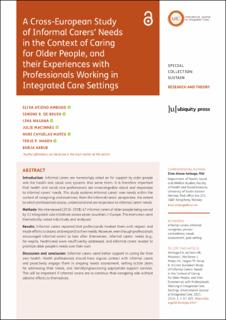| dc.contributor.author | Ambugo, Eliva Atieno | |
| dc.contributor.author | de Bruin, Simone R. | |
| dc.contributor.author | Masana, Lina | |
| dc.contributor.author | Macinnes, Julie | |
| dc.contributor.author | Mateu, Nuri Cayuelas | |
| dc.contributor.author | Hagen, Terje P. | |
| dc.contributor.author | Arrue, Borja | |
| dc.date.accessioned | 2022-03-17T13:48:17Z | |
| dc.date.available | 2022-03-17T13:48:17Z | |
| dc.date.created | 2022-01-31T09:29:15Z | |
| dc.date.issued | 2021 | |
| dc.identifier.citation | Ambugo, E. A., de Bruin, S. R., Masana, L., MacInnes, J., Mateu, N. C., Hagen, T. P., & Arrue, B. (2021). A Cross-European Study of Informal Carers’ Needs in the Context of Caring for Older People, and their Experiences with Professionals Working in Integrated Care Settings. International Journal of Integrated Care, 21(3), Artikkel 2. | en_US |
| dc.identifier.issn | 1568-4156 | |
| dc.identifier.uri | https://hdl.handle.net/11250/2985906 | |
| dc.description.abstract | Introduction: Informal carers are increasingly relied on for support by older people and the health and social care systems that serve them. It is therefore important that health and social care professionals are knowledgeable about and responsive to informal carers’ needs. This study explores informal carers’ own needs within the context of caregiving; and examines, from the informal carers’ perspective, the extent to which professionals assess, understand and are responsive to informal carers’ needs.
Methods: We interviewed (2016–2018) 47 informal carers of older people being served by 12 integrated care initiatives across seven countries in Europe. The interviews were thematically coded inductively and analysed.
Results: Informal carers reported that professionals treated them with respect and made efforts to assess and respond to their needs. However, even though professionals encouraged informal carers to look after themselves, informal carers’ needs (e.g., for respite, healthcare) were insufficiently addressed, and informal carers tended to prioritize older people’s needs over their own.
Discussion and conclusion: Informal carers need better support in caring for their own health. Health professionals should have regular contact with informal carers and proactively engage them in ongoing needs assessment, setting action plans for addressing their needs, and identifying/accessing appropriate support services. This will be important if informal carers are to continue their caregiving role without adverse effects to themselves. | en_US |
| dc.language.iso | eng | en_US |
| dc.rights | Navngivelse 4.0 Internasjonal | * |
| dc.rights.uri | http://creativecommons.org/licenses/by/4.0/deed.no | * |
| dc.title | A Cross-European Study of Informal Carers’ Needs in the Context of Caring for Older People, and their Experiences with Professionals Working in Integrated Care Settings | en_US |
| dc.type | Peer reviewed | en_US |
| dc.type | Journal article | en_US |
| dc.description.version | publishedVersion | en_US |
| dc.rights.holder | © 2021 The Author(s). | en_US |
| dc.source.volume | 21 | en_US |
| dc.source.journal | International Journal of Integrated Care (IJIC) | en_US |
| dc.source.issue | 3 | en_US |
| dc.identifier.doi | https://doi.org/10.5334/ijic.5547 | |
| dc.identifier.cristin | 1994170 | |
| dc.relation.project | EU – Horisont Europa (EC/HEU): 634144 | en_US |
| dc.source.articlenumber | 2 | en_US |
| cristin.ispublished | true | |
| cristin.fulltext | original | |
| cristin.qualitycode | 1 | |

